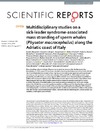Identificador persistente para citar o vincular este elemento:
https://accedacris.ulpgc.es/jspui/handle/10553/42096
| Título: | Multidisciplinary studies on a sick-leader syndrome-associated mass stranding of sperm whales (Physeter macrocephalus) along the Adriatic coast of Italy | Autores/as: | Mazzariol, Sandro Centelleghe, Cinzia Cozzi, Bruno Povinelli, Michele Marcer, Federica Ferri, Nicola Di Francesco, Gabriella Badagliacca, Pietro Profeta, Francesca Olivieri, Vincenzo Guccione, Sergio Cocumelli, Cristiano Terracciano, Giuliana Troiano, Pasquale Beverelli, Matteo Garibaldi, Fulvio Podesta, Michela Marsili, Letizia Fossi, Maria Cristina Mattiucci, Simonetta Cipriani, Paolo De Nurra, Daniele Zaccaroni, Annalisa Rubini, Silva Berto, Daniela de Quiros, Yara Beraldo Fernandez, Antonio Morell, Maria Giorda, Federica Pautasso, Alessandra Modesto, Paola Casalone, Cristina Di Guardo, Giovanni |
Clasificación UNESCO: | 3109 Ciencias veterinarias | Palabras clave: | Population-Structure Fin Whales Dolphin Morbillivirus Balaenoptera-Physalus Cetacean Strandings, et al. |
Fecha de publicación: | 2018 | Editor/a: | 2045-2322 | Publicación seriada: | Scientific Reports | Resumen: | Mass strandings of sperm whales (Physeter macrocephalus) are rare in the Mediterranean Sea. Nevertheless, in 2014 a pod of 7 specimens stranded alive along the Italian coast of the Central Adriatic Sea: 3 individuals died on the beach after a few hours due to internal damages induced by prolonged recumbency; the remaining 4 whales were refloated after great efforts. All the dead animals were genetically related females; one was pregnant. All the animals were infected by dolphin morbillivirus (DMV) and the pregnant whale was also affected by a severe nephropathy due to a large kidney stone. Other analyses ruled out other possible relevant factors related to weather conditions or human activities. The results of multidisciplinary post-mortem analyses revealed that the 7 sperm whales entered the Adriatic Sea encountering adverse weather conditions and then kept heading northward following the pregnant but sick leader of the pod, thereby reaching the stranding site. DMV infection most likely played a crucial role in impairing the health condition and orientation abilities of the whales. They did not steer back towards deeper waters, but eventually stranded along the Central Adriatic Sea coastline, a real trap for sperm whales. | URI: | https://accedacris.ulpgc.es/handle/10553/42096 | ISSN: | 2045-2322 | DOI: | 10.1038/s41598-018-29966-7 | Fuente: | Scientific Reports[ISSN 2045-2322], v. 8, 11577 |
| Colección: | Artículos |
Citas SCOPUSTM
24
actualizado el 08-jun-2025
Citas de WEB OF SCIENCETM
Citations
26
actualizado el 18-ene-2026
Visitas
125
actualizado el 27-jul-2024
Descargas
153
actualizado el 27-jul-2024
Google ScholarTM
Verifica
Altmetric
Comparte
Exporta metadatos
Los elementos en ULPGC accedaCRIS están protegidos por derechos de autor con todos los derechos reservados, a menos que se indique lo contrario.
